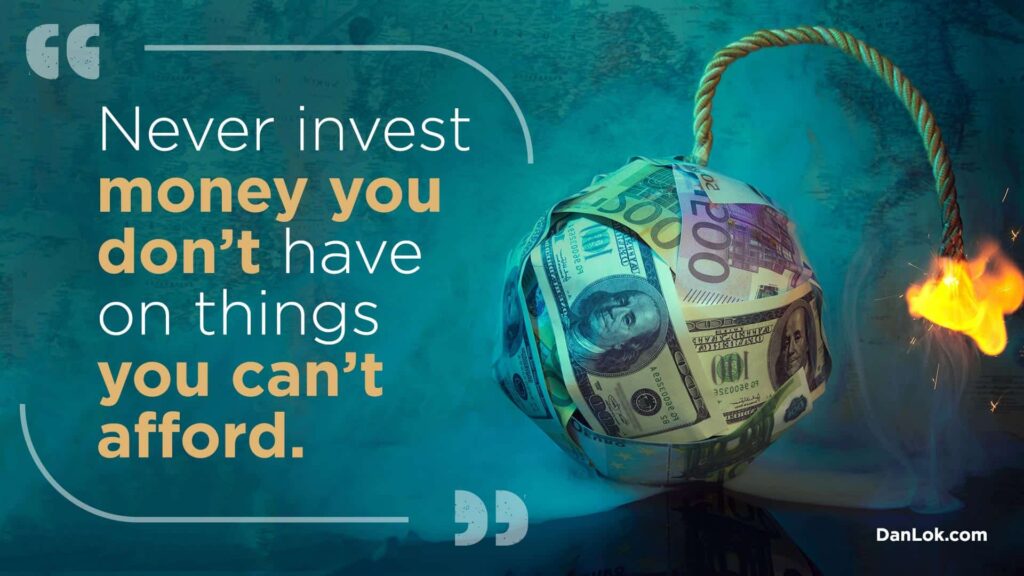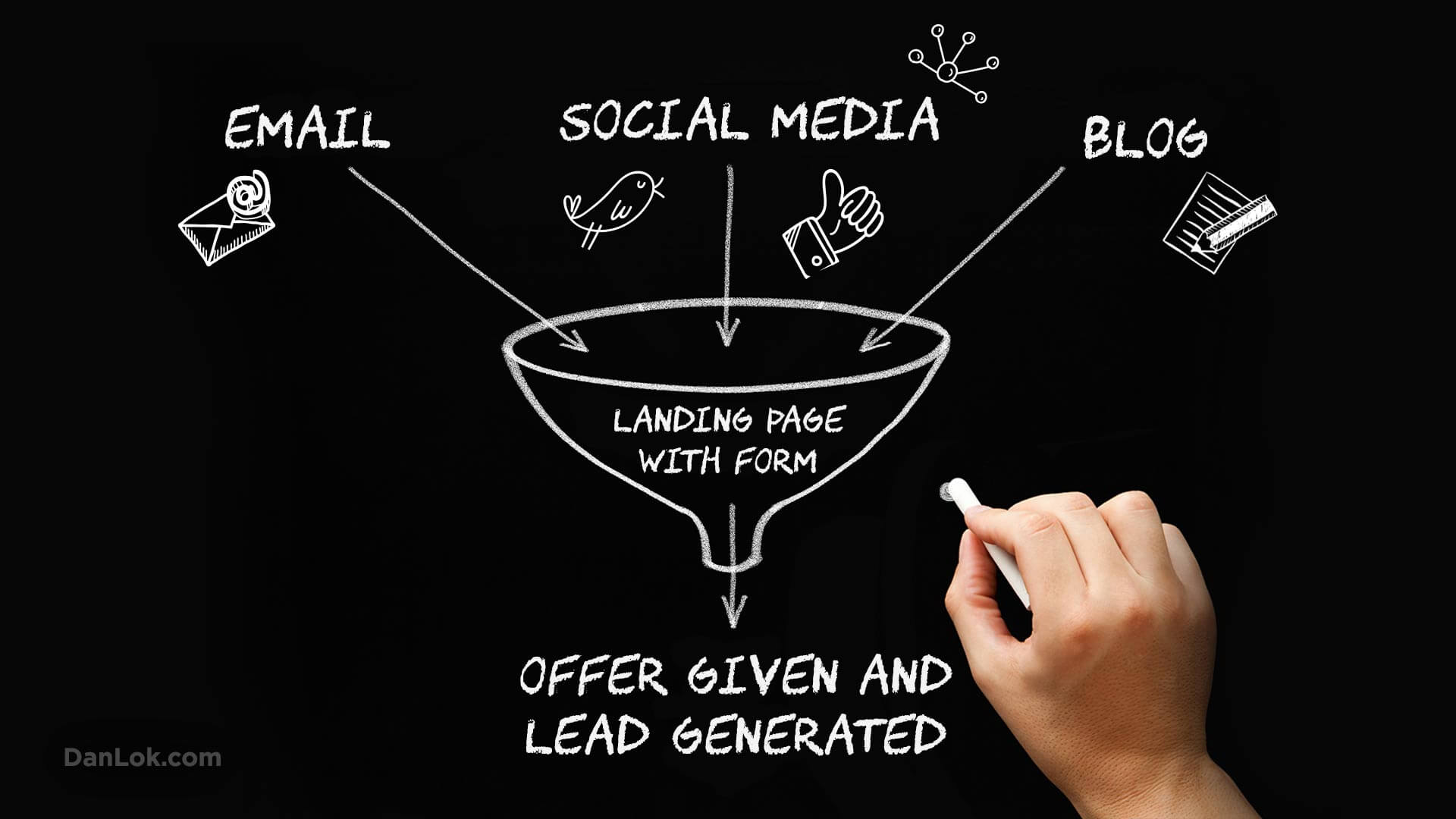Investment strategies are risky, right? It’s a common belief that all investments are risky, but maybe that’s only if you don’t understand what you’re investing in.
On the news, you hear about investors who lost all their money. On TV shows they show you the downfall of the successful CEO because he got greedy and invested too much.
But surprisingly, only people with a “poor” mindset believe that investments are always risky. What do I mean by a “poor” mindset? I’m referring to people whose thinking and belief systems are very limited. They see competition everywhere, and are afraid because their resources are limited.
Wealthy people, on the other hand, live in abundance. They know they have more than enough resources to make mistakes.
The thing is, once you reach a certain income, the whole investment world suddenly opens up to you.
Before, you weren’t able to invest. Why? Because you were focusing on making a living. Once you reach a certain income, you have more money than you need to live comfortably. That’s the money you use to invest.
You take that “extra money” and use it for investments. If you don’t have a lot of extra money, maybe you do need to be more careful about what you invest in.
I recommend you learn about investment strategies. Do so before you put a single dollar into something that you don’t understand.
Investment is in fact, risky, if you have no idea what you are doing. If you are new to investing, or you don’t understand what you’re investing in, it can be risky.
You hear that other people got a great return on their investment doing this or that. Immediately, you try to do the same. But how do you know that your source is credible? How can you shield yourself from investments that are too risky?
Rich and wealthy people have been doing this for some time. They know how to play the “investment game” – and what to avoid.
That’s why today, I want to go over 5 investment strategies wealthy people use to minimize risks.

Investment Strategy #1: Only Invest In What You Understand
Even in the investment sector, there are new fads and trends. Many people would hop on to those trends and try to make money fast.
There are so many people looking for the fastest way to get money. They get caught up in the newest gimmick…
On the news, they hear that people got rich with Bitcoin. They instantly try to do the same. Once that trend dies down, they will find the next one. But still, they lose a lot of money. It’s a very risky strategy.
I never ever invested in Bitcoin or any other trendy, gimmicky thing. Why?
Because I only invest in things I understand. That’s the foundation of my investment strategies.
Putting your money into something you have no clue about – that’s risky.
Even if it worked for others. To make it work for you, you have to understand it.
So, if you are completely new to the investment world, you might want to learn at least some basics.
Investing is a lot like playing a board game. If you don’t know the rules, you can’t play. And you most likely won’t win.
So rich people only invest in what they truly understand. Most wealthy people, they understand stocks or real estate investments.
I personally always prefer real estate, because I can control parts of it. I know the rules of the real estate investing game. That allows me to predict and avoid most risks.
Why You Should Invest in Stocks or Real Estate
Stocks and real estate seem to be the favorites of most wealthy people. Why is that?
Because they produce a high-return. If you invest in something, you want it to be worth it. That’s why high-return investments are best.
So, while a person with a “poor” mentality would invest in whatever they get their hands on, wealthy people invest in what they truly understand. They are immune to trends because they are patient.
The rich don’t care about the short term wins of trendy cryptocurrencies. They look for long-term, high-return investments.

The Problem With Trends Like Bitcoin
I personally don’t like the latest investment trends. Why? Because it’s not stable.
They promise you fortunes but the investment is actually risky.
Also, I don’t know enough about it, that’s why I would never invest in it.
Most of those trends die down eventually and the investors lose quite some money.
Investment Strategy #2: Evaluate Before You Invest
The next one of the investment strategies of the wealthy is this: they know how to evaluate an opportunity.
If they get offered an investment, they don’t jump on immediately. They evaluate first.
They know what to look for and check if the investment would be too risky.
Being a good investor means you turn down a lot of chances.
You don’t blindly hop onto every single opportunity.
Wealthy people are patient. They take a step back to think about it. And then they take the right decision.
I personally refuse almost 99% of my investment opportunities – because I know exactly what I’m looking for.
I learned what to look for in an investment. Those pointers will tell me how risky it is.

Learn The Language of Money
Rich people speak the language of money. They know how to read financial statements. They understand tax systems.
If you are new to this, you might feel overwhelmed. But it’s learnable.
You don’t have to become an accountant to understand all this. But if you want to make money, you have to understand how it works.
But that’s why I recommend not to jump into the next best thing. Take your time to understand what you are doing.
So, what can you do? You should get familiar with the financial language. Common words like “interest rates”, “mortgage”, “bonds” and so on…
I call this “financial literacy.”
In day-to-day life, you need to be able to read so you can navigate yourself. Imagine you wouldn’t be able to read…what would that mean? You’d blindly trust others and hope they don’t betray or scam you. You would be pretty helpless in some situations.
It’s the same in the financial world. Without financial literacy, you are helpless. You might overlook important facts or evaluate the risk on investments all wrong.
Poor people jump right into the investment. Wealthy people learn vocabulary first. Poor people try to wing it. The wealthy evaluate, learn and act. They follow the strategy of evaluating before investing.
Investment Strategy #3: Have Some Money Ready
To invest you need a bit of cash that you can spend freely. So, ideally you have some money on the side that you use specifically for investments.
This money should be extra cash. Don’t go out and spend the money you need to secure your daily living.
How much money you need will depend on what kind of investment you want to make.
In real estate, there are ways to start out with a few hundred dollars. That’s why I like real estate. You can start quite easily and still get high-returns.
For other investments, you might need a bit more money.
That’s why investing is a game of wealthy people. If you don’t have a stable income yet, investing can be extremely risky.
That’s also why so many people loan money from a bank so they can invest. I don’t recommend it as has a high risk. You don’t want to get yourself in debt.
If you have the cash, however, the investment will reward you with even more money. That again gives you more extra money for the next investment. You’ll only become wealthier and wealthier.
Where Do You Get The Money to Start?
Well, the common strategy would be to take on a loan. I don’t like that idea, however.
I firmly believe, if you can’t pay the money out of your own pocket – then you aren’t investment ready yet. You are still in the phase of building your living.
You need to work on your income first. There are two ways.
It can come from your business or your high-income skill.
Both can get you enough money. Once you live comfortably, you take that extra money and invest it. Then you only get wealthier and wealthier.
That’s why, once you reach a certain income, keeping it isn’t that hard anymore.
But make sure to get there before you start investing all your money.

Start Small
What most people get wrong is this: they think they have to invest huge sums of money. That’s actually not true. Investing is not about how much you put in, it’s about how much you get out of it. Share on XSome people who followed me for some time know the wealth triangle I often talk about. The natural order of the wealth triangle is: develop your skill – scale it – start to invest.
This is one of the investment strategies I suggest because it’s very safe. Normally, I would suggest starting investing, as soon as your skill pays you 10,000$ a month.
But, this is the point most people misunderstand. I’m not telling you to go ahead and invest 10,000$. I’m telling you to take a bit of that money and use it for investing. It’s great to start small.
If you focus on high-return investments, it’s possible to start with a few hundred bucks and get high-returns on that.
Let’s say you start small and invest 100$. You get back 120%. You just got 20% on your investment back.
Invest the money you have in things you can afford. Even if you don’t have 10,000$ a month yet, you can start out. Waiting gets you nowhere. Your actions will be rewarded.
The sooner you start, the better. Start building the habit of investing as soon as you can. The sooner you start, the better you will become fast.
To have what wealthy people do you need to be and think like a wealthy person. What habit do most rich people have? They invest. So start building that habit now.
Don’t wait until you are successful. Do it now and become successful.
Investment Strategy #4: Know That Investors Keep Secrets
Wealthy people don’t boast and brag about the ways they invest. Sometimes, they actually want to keep it from the public. They don’t want it to get too popular.
I was quite surprised when I learned how the wealthy invest in real estate. They are using strategies you can’t find in books or even on the internet. Nobody teaches these things.
For example, in North America they would use Tax Lien Certificates…hardly any investors ever heard of this before.
What Are Those Secrets?
You can imagine it like this. If somebody owns a property – like a house for example – they have to pay taxes for it.
Now, if somebody isn’t able to pay their taxes, the state is losing money. But that money is needed for public services like the police, hospitals, school, roads and so on.
So, the state wants that money fast. If you are an investor, the state allows you to basically buy these taxes – in the form of a Tax Lien Certificate.
You are not buying the real estate – only the Tax Lien Certificate that is attached to it.
Imagine it like you would pay somebody else’s taxes. Why would you want to do that? Because it allows you to receive all the outstanding money. But there is more to it…
The owner of the house has to pay certain penalty fees because he paid too late. Guess who gets that money? YOU – the investor who now owns the Tax Lien Certificate.
Now the way wealthy people invest in North America is just incredible. Their strategies are stable, no matter how the economy will change in the future.
Usually, they are making 24% on interest rates.
And the best part? You don’t need to live in North America to do this. Let me share more about that a bit further below…
They Invest Differently
Normally, when you invest in real estate, you need people to assist you. Like brokers and financial advisors for example.
But with the strategies of the ultra-affluent, you don’t need any of these people.
With these kinds of investments, your money is basically protected by the law.
But the public doesn’t really know this because rich people like to keep their investment strategies a bit like a secret.
If too many people know and use these strategies, the demand might get too high. Or the banks get angry and change things up.
That’s another reason why I don’t like investment trends. It’s so popular it will only work for a limited time. Once too many people hop on the trend it will break down.
So the best way to find less risky investments is to talk to other wealthy people. See why it worked for them and how it could work for you.

Investment Strategy #5: Invest in Yourself
One of the most important investment strategies of the wealthy, is to invest in yourself.
The rich aren’t afraid to invest money on seminars and courses. They know that they need to upgrade their skills and abilities. Only that way can you get and stay wealthy.
Investing in yourself is one of the safest ways. Why? Because, no matter the economy, you can always rely on yourself. Share on XYou don’t pay any interest on your abilities. Once you mastered something, nobody can take that away from you.
When you have valuable skills you will always be in demand, no matter how good or bad the economy is.
So while wealthy people invest in other sectors, they also invest in themselves.
What are some great ways to invest in yourself?
- Read a book and implement your learnings
- Go through a training
- Visit a seminar
- Learn a new skill (preferably a high-income skill)
Are You Ready To Invest in Yourself?
Now, what if I told you that you can learn more about the investment strategies of the wealthy?
From February 23rd to 24th, I’m hosting an exclusive event. It’s called Secret Of The Rich – because we will go over the secret investment strategies of the rich.
This is your chance to learn more about Tax Lien Certificates. You can use these strategies even if you don’t live in North America. And you only need a few hundred dollars to start out.
You can view this as an exclusive chance to invest in yourself. The skills you’ll learn at Secret Of The Rich are yours forever. Nobody can take that from you.
There is one catch, however. The seats at the event are now sold out. But there were so many people who didn’t get a ticket, so I decided to offer a live stream. When you get a live stream ticket, you will also get a full recording.
At Secrets Of The Rich, you’re going to learn how to thoroughly review an investment before putting one single dollar into it.
You’ll know exactly what you’re getting yourself into. What your exit strategies are. And what you need to do to make this investment work.
So you’ll always be able to “look before you leap” so to speak. And that’s exactly what the rich do to minimize risk.
























